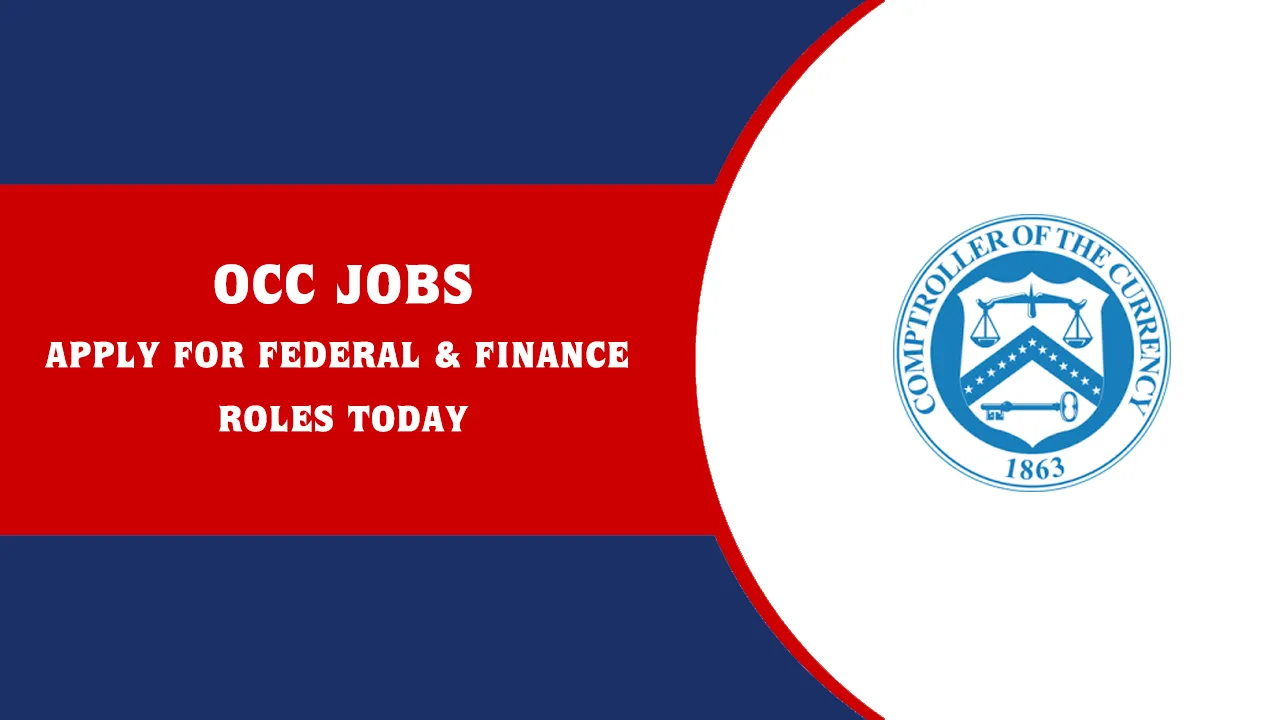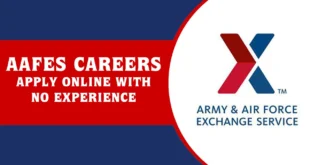Ever thought about working for the federal agency that keeps America’s banks in check? Then it’s time for you to take a closer look at OCC jobs. In recent years, more Americans have started paying increased attention to government-backed finance jobs, not only for the stability they offer but also for their actual impact and career-building potential. These positions come with a sense of public purpose and the kind of benefits that are often missing from the private sector. Among the top institutions providing such opportunities is the Office of the Comptroller of the Currency, a federal agency that is responsible for maintaining the health of the US banking system.
With OCC careers, you’re not just getting a job. The agency provides an entry point into one of the most important branches of the government’s financial oversight system. For recent graduates hoping to enter the finance sector, this organization opens doors to internships and developmental programs designed specifically for students. This helps them become familiar with real federal operations from day one. At the same time, those with prior experience in law, economics, information technology, or accounting can access career paths that are not only stable but also future-focused. So apply today!
For More Latest Private Jobs: Click Here
| Company Name: | OCC |
| Job Locations: | United States |
| Last Updated on: | August 15th, 2025 |
OCC Jobs in United States | Current Employment Opportunities

About the OCC: A Quick Company Overview
The Office of the Comptroller of the Currency is an independent bureau of the US Department of Treasury. Established in 1863 during the Civil War, its primary role was to charter, regulate, and supervise all national banks and federal savings associations. Over time, it expanded its scope to include oversight of the federal branches and agencies of foreign banks operating within the United States. The agency was created under the National Currency Act, which laid the foundation for a system of nationally chartered banks.
It continues to serve as a key factor in maintaining the safety and soundness of the country’s banking infrastructure. Currently, the OCC employs more than 3,500 individuals who are located throughout the United States. The agency’s national headquarters are based in Washington, D.C., but its operations extend across four district offices in New York, Chicago, Dallas, and San Francisco. These regional offices oversee local supervisory offices and field staff who conduct examinations and investigations of banks under their jurisdiction.
Work Culture and Environment at OCC
The Office of the Comptroller of the Currency offers an environment that reflects the competence and accountability expected of a federal regulatory body. Employees often highlight the balance between rigorous work and flexible support systems that allow them to manage personal commitments. Government job stability is a clear advantage at the OCC, and it’s reinforced by policies that prioritize long-term career development. Unlike fast-paced corporate offices that are driven by profit margins, the OCC focuses on sustainability and public service, which gives staff a sense of mission.
The agency’s commitment to diversity, equity, and inclusion is also deeply embedded in its hiring, training, and leadership pipelines. From employee resource groups to diversity councils, OCC ensures that voices from all backgrounds are represented in decision-making. Staff are regularly encouraged to bring their full selves to work, and leadership actively promotes equity as a measure of success. This culture is not performance-driven but grounded in actionable policies that impact recruitment, retention, and internal promotions. For bank examiners and others in field roles, travel can be an integral part of the job. In addition, you should consider the following factors:
- New hires at the OCC are often paired with mentors who guide them through early challenges and help them adjust to the agency’s unique pace and standards.
- Team-building initiatives, such as regional retreats and cross-departmental projects, help foster connection across geographic locations.
- Employees have access to professional development resources, including conferences, leadership training, and tuition reimbursement for continuing education.
- The OCC places a high emphasis on ethical conduct and transparency, which sets a strong tone from leadership and shapes the everyday work culture.
- Flexible schedules and telework opportunities are offered in many roles, encouraging employees to balance productivity with wellness.
- Employees working in regional offices can benefit from localized team cultures while staying connected to national strategies and directives.
- Annual surveys and feedback loops are used to improve workplace practices, ensuring that employees’ voices influence ongoing policy updates.
OCC Jobs Near Me
Job seekers often wonder whether a role at a federal agency means relocating to Washington, D.C., but that’s not the case with the OCC. With its structured regional system and a field-based workforce, the agency operates in multiple cities across the country. Whether you’re on the East Coast or in the Midwest, there are likely roles near your location. This makes it easy for people to find OCC jobs near them and match their expertise without having to relocate. Here are a few of their most popular locations.
Headquarters – Washington, D.C
The OCC’s national headquarters is located in the heart of Washington, D.C., and serves as the central hub for leadership, policy-making, and strategic planning. Many senior-level positions, legal roles, and policy advisor jobs are based here. Candidates aiming for federal leadership or behind-the-scenes work on financial regulation will find opportunities aligned with national impact in this location.
District Offices – New York, Chicago, Dallas, San Francisco
Each district office covers a broad geographical region and houses teams of bank examiners, analysts, and support staff. These offices are excellent entry points for roles that combine field work and office collaboration. Job seekers in these cities often find a variety of openings suited to different career stages, from recent grads to experienced professionals.
Field Offices – Nationwide Coverage
Beyond its district centers, the OCC maintains field offices across the country to ensure local presence in key banking markets. These positions are often filled by examiners and specialists who conduct on-site reviews of national banks and savings associations. Field-based employees typically work independently or in small teams, often traveling within a defined region.
Remote and Hybrid Opportunities
As part of its modernization efforts, the OCC has expanded its remote job offerings. Many IT, compliance, and analyst positions now allow full-time telework or hybrid schedules. This flexibility is especially appealing to professionals who want the benefits of federal employment without relocating or enduring daily commutes.
Types of Jobs Available at OCC
Many people don’t realize how broad the scope of OCC jobs is. While it’s known for its primary role in bank supervision, the agency relies on a wide array of professionals to carry out its mission. From finance to law to cybersecurity, each department plays a critical part in the agency’s operations. Whether you’re entering the workforce, switching careers, or looking for leadership opportunities, OCC offers a structure where progression is possible. Below are the most common job types found at the agency, broken down for a better understanding of each role.
Bank Examiner Roles
Bank examiners are on the frontline of the OCC’s oversight efforts. These professionals visit banks across the country to evaluate their financial health, risk controls, and compliance practices. They ensure that institutions are operating within legal frameworks and help identify any threats to their economic stability. Entry-level examiners are trained through extensive onboarding programs and gradually advance into more specialized or supervisory roles.
Economists and Financial Analysts
These roles focus on interpreting data, modeling financial trends, and informing policy decisions. Economists often work on research projects that assess the health of the banking system, while financial analysts may evaluate risks or propose changes to supervision strategies. These positions typically require strong academic backgrounds and analytical skills, with opportunities for publishing, presenting, and advising senior leadership.
IT and Cybersecurity Specialists
As the banking sector becomes more digital, the OCC has increased its focus on technology-driven risk. IT professionals manage internal systems, data infrastructure, and digital platforms, while cybersecurity experts assess the digital safeguards of regulated banks. These roles often involve working on secure networks and may include remote options for qualified candidates.
Administrative and HR Roles
Behind the scenes, administrative professionals keep the agency running smoothly. From handling travel logistics for examiners to managing human resource functions like recruiting and benefits, these roles are key to their daily operations. They often appeal to candidates looking for federal experience in a non-specialised capacity and offer clear pathways to growth.
Internships and Student Programs
The OCC offers a number of opportunities for students through internships and the federal Pathways Program. These roles are designed to give young professionals a first-hand look at public service and financial regulation. Interns work on real projects under the guidance of experienced mentors, and successful participants often have a competitive edge in future full-time positions.
Remote Jobs and Flexible Work Options
In response to evolving work trends, the OCC has integrated remote options across several departments. These roles include IT, research, compliance, and administrative support. Remote employees are fully incorporated into teams, attend virtual meetings, and access federal resources from anywhere in the country. This flexibility makes OCC jobs more accessible than ever for individuals with geographical limitations or work-from-home preferences.
OCC Salary and Benefits
You don’t just get an impressive federal title when you apply for OCC jobs. Employees receive generous salaries that follow both the federal government’s General Schedule (GS) pay scale and unique OCC-specific pay bands. Entry-level bank examiners, for instance, often start around $59,000, with experienced professionals climbing well past $117,000 depending on location and performance. Economists and financial analysts typically fall into higher pay bands, with some roles reaching the $140,000 range. Legal professionals can command even more, especially if they bring specialized knowledge or litigation experience.
Additionally, the benefits package at OCC is also an important attraction. Employees receive access to the full suite of federal health insurance options, which includes coverage for medical, dental, vision, and long-term care. Retirement benefits are managed through the Federal Employees Retirement System (FERS), which includes a pension, Social Security, and the Thrift Savings Plan (similar to a 401(k). Generous paid leave policies ensure that employees can take care of their personal needs without stress, including vacation days, sick leave, and federal holidays. Among their other perks are:
- Employees working in high-cost cities like New York and San Francisco may qualify for locality pay adjustments, significantly boosting their overall compensation.
- OCC staff are often eligible for annual performance bonuses that reward exceptional contributions to regulatory work or agency-wide initiatives.
- The agency’s flexible spending account allows employees to set aside pre-tax income for healthcare and dependent care expenses.
- OCC offers life insurance plans at group rates with optional add-ons for family members, giving employees additional peace of mind.
- Transport subsidies are available for employees who commute via public transit, easing the financial burden of getting to and from work.
- Parental leave policies allow new parents to take extended time off without worrying about job security or income loss.
- Employees also have access to wellness programs, mental health counseling, and support networks to promote a healthier work-life experience.
Eligibility Criteria
In order to maintain the high standards of federal financial oversight, OCC jobs enforce strict, yet accessible eligibility requirements. Although some expectations are universal, they are based on the role. Most professional positions require a relevant academic background, such as a degree in finance, law, economics, or IT. Entry-level roles are often open to candidates with limited experience, provided they demonstrate strong analytical skills and a willingness to learn. For those applying to senior or specialized positions, previous experience in banking, regulation, or compliance is typically a prerequisite. Additionally, these criteria must be met as well.
Educational Qualifications
Applicants are expected to hold a bachelor’s degree or higher in a relevant field such as business administration, finance, accounting, law, or information systems.
Work Experience Requirements
Some roles require only a year or two of experience, while others, especially at the mid- and senior-level, require five to ten years.
Background Checks and Security Clearance
For specific roles, a security clearance may be required in addition to financial records, legal history, and references.
Citizenship and Other Legal Requirements
Candidates must be U.S. citizens and meet federal employment eligibility criteria as outlined by the Office of Personnel Management.
Skills That Boost Your Chances
Strong communication, analytical thinking, regulatory knowledge, and adaptability to complex systems are highly valued by hiring managers at the OCC.
How to Apply for OCC Jobs?
Applying for OCC jobs requires a combination of preparation, accuracy, and familiarity with federal hiring procedures. Most job openings are posted on the official OCC careers portal, where applicants can filter roles by location, department, and experience level. Each job listing includes detailed qualifications, salary information, and application instructions. Once you find a position that fits your profile, you’ll need to submit a federal-style resume that highlights your accomplishments rather than job duties. This is different from traditional private-sector applications, so candidates should customize their document accordingly and follow formatting guidelines closely.
After submitting your application, expect a multi-phase process. This may include an initial review of eligibility, online assessments, and possibly an interview conducted via phone or video. If you pass these stages, you may be asked to complete further paperwork and background investigations. Some roles will require additional testing or case-based exercises, especially analytical and legal positions. Patience is key as federal hiring can take several weeks, but candidates who remain responsive and engaged throughout the process often receive detailed communication and guidance along the way.
Summary
For anyone considering a stable, impactful career in public service and financial oversight, OCC jobs represent a powerful opportunity to work at the intersection of regulation, economics, and national policy. The agency’s expansive network, mission-driven environment, and career-long development pathways make it an ideal destination for professionals at all levels. Whether you’re just starting out or looking for meaningful change, this is a place where your work will always matter.
 Find Newest Jobs in USA
Find Newest Jobs in USA



